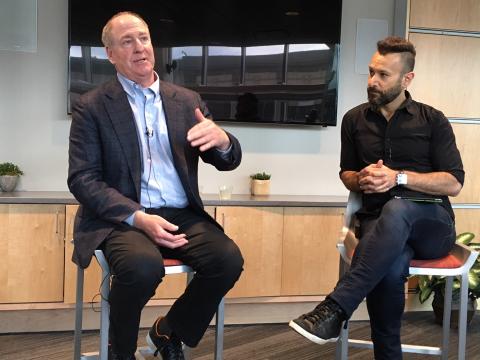Career Advice from the Advisor to Lebron, Schwarzenegger, and Jimmy Iovine

Paul Wachter, left, talks to Berklee students during his Creative Entrepreneurs Conversation with Panos Panay, founding managing director of BerkleeICE.
Photo by: Rob Hochschild
When Paul Wachter—financial advisor to many of the biggest names in entertainment and sports—visited Berklee on April 25, he turned one of the most-heard career maxims on its ear.
"It's not about who you know, it's about what you know," he told a group of Berklee students, faculty, and staff in the Eisenson Room. It was the the latest Creative Entrepreneurs Conversation, produced by the Berklee Institute for Creative Entrepreneurship (BerkleeICE).
"Working for well-connected people," he said, "doesn't guarantee you long-term success. You still have to deliver the goods, over and over. Wachter's roster of notable clients includes LeBron James, Jimmy Iovine, Arnold Schwarzenegger, Bono, and Tom Werner."
"I have great relationships with all of these people, but if I were screwing up their deals...leaving them exposed, or losing them money, I wouldn't have much of a business," said Wachter. "It's about having those people respect you because of what you know and what you do for them... You have to have the foundation to earn people's respect and trust and then you can have a relationship that's much broader."
During Wachter's conversation with Panos Panay, BerkleeICE founding managing director, he touched on a range of subjects relating to his experience and provided advice to students about how to approach their careers.
On the Building Blocks
You have to have a foundation and focus when you're young. I spent a long time getting the building blocks. I went to law school, I went to Wharton, I worked on Wall Street. I'm not saying that's what anyone should do. I'm just saying that's what I did. By the time I launched into this entrepeneurial venture -- Main Street Advisors--, I had a really good foundation and good building blocks... I'm much better at it then I was 20 years ago, but even then at least I had a strong foundation.
On the Value of Film, Television, and Music
One thing that's great for the entertainment industry is that content is not going anywhere. It's just getting more and more valuable... The movie industry is not a great industry, return on investment-wise, but the long-term value of that content is still very solid. Television, even better maybe. Music is in a weird place, because it...doesn't have the economic drivers in place as well as the television and movie industries do right now. And the reason for that is the distribution. The distribution in television and movies is still basically in place and growing. You're still paying for content most of the time. The problem with music is you have YouTube out there. And you have Spotify's free service and Pandora's free service. In music, streaming is the best thing that's happened and streaming can be the savior of the industry. How far it brings it back, I don't know.
On Working with Jimmy Iovine and Dr. Dre on Beats Headphones
If you're trying to harness the power and culture of music in a product, what could be more authentic than headphones? Nothing. There was an opening in the market for someone to do something special with headphones, and we had real authenticity, because not only did we have Dre and Jimmy, we had all of these other artists who were interested in the delivery of better sound in the wake of mp3s and the earbuds that most people were listening through.
Jimmy and Dre listened to each headphone hundreds of times. That wasn't my job. Jimmy always listened to "Here Comes My Girl," a Tom Petty song that he had produced. And Dre always used "In Da Club," which he had produced. Every headphone, every prototype was listened to with the same two songs untold times, and they knew exactly what it was supposed to sound like. They had produced the song, they had heard them in the studio. It was the sound that the artist had wanted in the headphones...it was musicians creating a product for people who really love music. I think people felt the DNA.
On What His Major Clients Have in Common
They all have a unique intelligence. I'm sure there are many rock stars out there that are incredible musicians. Maybe great guitar players, great singers, even great songwriters. That doesn't mean that they're really brilliant. Bono, for example, is a uniquely intelligent person. His intelligence doesn't stop at the lyrics or at the music. It goes to trying to help people in the world. It goes to trying to understand politics, trying to understand poverty. It's just who he is.
Arnold, look at his career—there’s never really been anything like it. LeBron is so clever about the way he handles himself off the court and a genius on the court. I don’t have to tell this group how brilliant Jimmy is in music, but way beyond music. That’s what stands out with all my clients, it’s what I look for and it allows me to learn so much.
They're all big thinkers. They're not small thinkers. They're not just thinking about one thing, and they approach what their core business is with this very broad intelligence. And they all have interests beyond that.
